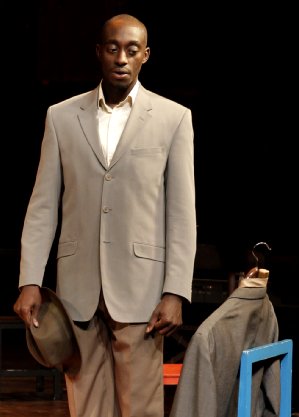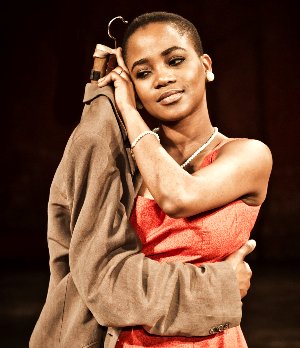 My friend Jan and I went to Seattle Rep to see “The Suit”, but on the way stopped on Capitol Hill to go to Blick Art Supplies and then to Panera for a bowl of soup - good soup. Then we braved the downtown Seattle construction delays and the overwhelming abundance of traffic; we were almost late for the production. And it is a wonderful play.
My friend Jan and I went to Seattle Rep to see “The Suit”, but on the way stopped on Capitol Hill to go to Blick Art Supplies and then to Panera for a bowl of soup - good soup. Then we braved the downtown Seattle construction delays and the overwhelming abundance of traffic; we were almost late for the production. And it is a wonderful play.
The production, “The Suit”, is based on a short story of the same name by Cam Themba, a South African who grew up in the townships he writes about. His stories earned him a Drum Award for showing “the harsh and depressing conditions of African life in the Johannesburg townships.”
Themba’s story was adapted by Peter Brook, Marie- Hélène Estienne and musician Franck Krawczyk, first in French and then back into English. Brook and Estienne are legendary adaptors, directors and musicians, always stripping away a production to show its essence. The staging, the set, the language, the costumes, and the story are all stripped of ruffles and flounces and presented in simplicity.

 There are three international actors: Ivanno Jeremiah who is Philemon; Nohlanhla Kheswa who plays Matilde, Philomon’s young and adulterous wife; and Jordon Barbour who plays the narrator and Philomon’s friend among other roles. There are also three musicians who add immeasurably to the production: Mark Christine, who plays accordion, keyboards, and other instruments; Arthur Astier, who plays guitar and bass guitar; and Mark Kavuma, a 20-year old trumpeter who’s played with Winton Marsalis and in the Jazz at the Lincoln Center Orchestra.
There are three international actors: Ivanno Jeremiah who is Philemon; Nohlanhla Kheswa who plays Matilde, Philomon’s young and adulterous wife; and Jordon Barbour who plays the narrator and Philomon’s friend among other roles. There are also three musicians who add immeasurably to the production: Mark Christine, who plays accordion, keyboards, and other instruments; Arthur Astier, who plays guitar and bass guitar; and Mark Kavuma, a 20-year old trumpeter who’s played with Winton Marsalis and in the Jazz at the Lincoln Center Orchestra.
 The story is simple. Predictable and conscientious Philemon works as a secretary for a Johannesburg lawyer. He loves and honors his wife Matilde, who stays at home in Sophiatown. One day on the train on his way to work, his friend tells him that his girlfriend has seen a young man going into the house after Philemon leaves for work each morning. Philemon immediately returns home by bus and discovers Matilde and her lover. The lover abruptly leaves, clad in just his underwear and leaving his suit behind. Philemon, devastated by Matilde’s betrayal, tells her that “There will be no violence in this house,” then cruelly goes on to tell her that she must treat the suit as an honored guest, talking to it, ‘feeding’ it at the dinner table, taking it on her walks with Philemon, and generally pretending that the suit is alive. This humiliates Matilda. She gets permission from Philemon to join a cultural group, which she loves. She’s singing, telling stories, and learning to cook from the other women, but this is just an interlude in her humiliation.
The story is simple. Predictable and conscientious Philemon works as a secretary for a Johannesburg lawyer. He loves and honors his wife Matilde, who stays at home in Sophiatown. One day on the train on his way to work, his friend tells him that his girlfriend has seen a young man going into the house after Philemon leaves for work each morning. Philemon immediately returns home by bus and discovers Matilde and her lover. The lover abruptly leaves, clad in just his underwear and leaving his suit behind. Philemon, devastated by Matilde’s betrayal, tells her that “There will be no violence in this house,” then cruelly goes on to tell her that she must treat the suit as an honored guest, talking to it, ‘feeding’ it at the dinner table, taking it on her walks with Philemon, and generally pretending that the suit is alive. This humiliates Matilda. She gets permission from Philemon to join a cultural group, which she loves. She’s singing, telling stories, and learning to cook from the other women, but this is just an interlude in her humiliation.
When they host a large party in their house, Philemon brings out the suit and asks her to introduce it to the guests. Philomon’s friend tells everyone the party is over and tells Philemon that he needs to forgive Matilda and forget the offense because this oppression of her is oppressing them both.
 This is a black box presentation, characteristic of Peter Brook’s productions. The setting of black curtains consists of spare, IKEA-plain chairs and square tables. The yellow, green and blue chairs serve as a bed as well as seating, and as delineators of the house’s space.
This is a black box presentation, characteristic of Peter Brook’s productions. The setting of black curtains consists of spare, IKEA-plain chairs and square tables. The yellow, green and blue chairs serve as a bed as well as seating, and as delineators of the house’s space.
Oria Puppo’s costume designs are simple as well. Philemon has one suit that he wears throughout the play. His friend is more casually dressed. Matilda’s light-tan sheath nightgown, her plain navy blue coat and hat, and her showstopper costume, a scarlet, square-necked, full-skirted dress for the party, are clues of the growth of self confidence and social awareness, a result of attending the cultural group meetings. One amusing costume note is that the musicians play women coming to the party, simpering and wearing women’s hats.
This is a wonderful production. For tickets and info, call the Seattle Repertory box office at 3206-443-2222 or go online at Seattle Rep and click on the buy button. “The Suit” is well worth seeing.





